Introduction:
The future is upon us, and it is harder than ever to be a software engineer. Technology is moving forward at a pace we have never seen before. Software engineering will be unrecognizable in five years. And it will not be just software engineering; it will be designing intelligent systems that work with AI tools; creating solutions to problems we have not yet seen.
So why is this important? Because the next five years won’t just determine what the engineers are doing, but whether they will still have as much of a place to do it. The tide of artificial intelligence (AI), cloud computing, edge computing, and emergent technologies will leave the profession very different from how it appears today.
This is not just someone’s opinion but the views of expert researchers and the person running the certificate, who is scrawling their comments on the wall, telling the writer to choose their option or be out.
Why the Next Five Years Matter for Software Engineering
Technology is like a speeding train. It has accelerated faster and faster every few years. Right now, we are about to enter a hyper-accelerated phase of technology.
AI is no longer an experiment in a lab. It is writing code with us. Cloud platforms are enabling collaboration and speed to scale. IoT and Edge Computing are creating a new kind of software.DevOps and automation are shrinking development lifecycles.
What this means is that the competencies that engineers used in 2020 to thrive in their craft may not lead to success in 2025. The industry of software engineering is shifting from manual coding to humans orchestrating code generated by AI.
This is why the next five years are no longer a transition, but a fight for survival.
What are the major factors influencing change in the industry?
Several forces will influence the future of software engineers:
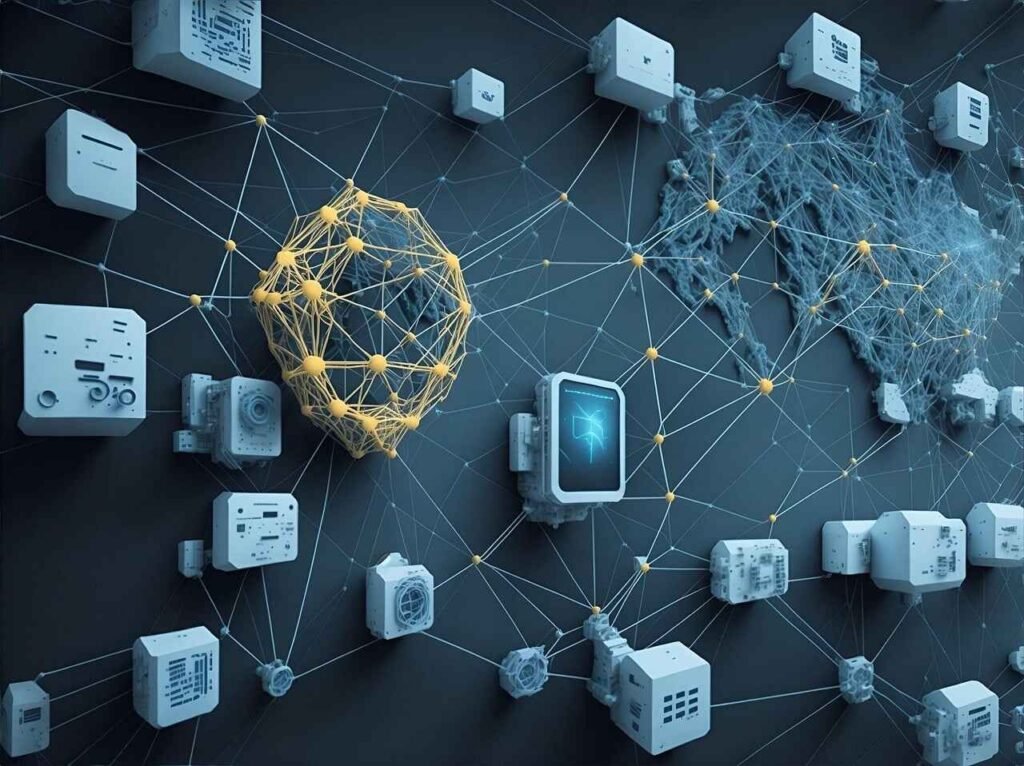
- AI & Automation – AI has already begun to alleviate things like code generation and low-level, repetitive tasks through automated bug detection, and the list will grow.
- Cloud-Native Development – Everything is scalable, elastic, and globally distributed.
- Remote Collaboration – Engineers can collaborate remotely from anywhere using GitHub, Slack, and Jira, which connect their teams.
- Emerging Tech – Edge computing, 5G, IoT, blockchain, and more have and will inevitably bring more distractions and opportunities.
- Industry Demands – Custom software is prevalent in healthcare, fintech, e-commerce, logistics, etc. Each demand for tailored solutions and evidence that generic solutions are no longer a viable and effective option.
All of the forces mentioned above create an environment where engineers have to constantly reinvent themselves.
The Role of AI, Cloud, and Emerging Technology
Satya Nadella, the CEO of Microsoft, said,
“AI is the defining technology of our times.”
He’s correct. AI is not an add-on anymore; it is a part of development. It can now create code snippets, write full functions, and suggest optimizations. Tools like GitHub Copilot are already shifting the way that developers work by making repetitive coding tasks faster.
Jeff Dean, Senior Fellow at Google AI, states,
“AI is going to open up new frontiers of use cases that we cannot even imagine today”.
AI is not only working with engineers to help them work faster, but it is also continually redefining what engineers will build in the first place.
The Cloud? Collaboration is now limitless. Your coworkers can be on five different continents, developing, testing, and deploying software in real-time. Add Edge Computing plus IoT, and you will start to see a future where applications are no longer just in the cloud, but also encompass everything from smart home applications to self-driving cars.
Skills Every Engineer Should Develop That will Last well into the Future
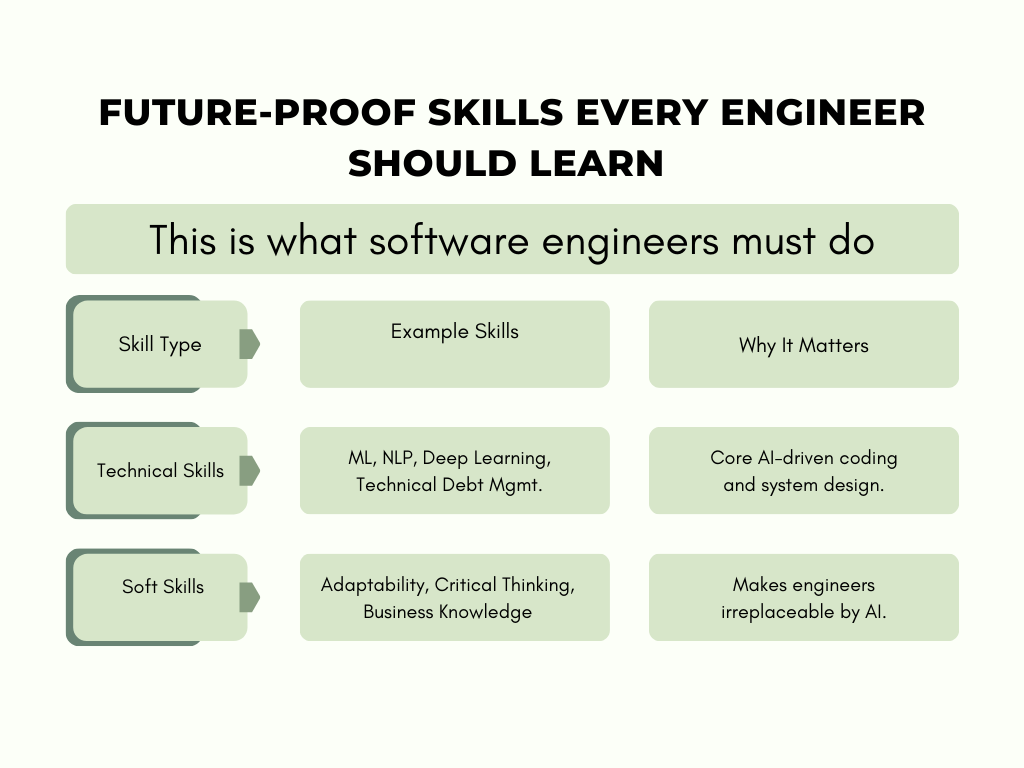
Grady Booch, one of the “godfathers” of Modern Software Engineering and co-creator of UML, once said, “The best way to predict the future is to invent it.”
This is what software engineers must do—REinvent their talents and skill set.
Technical Skills
- Machine Learning (ML) & Data Science: to work with AI rather than against it.
- Neural Networks & Deep Learning: to better understand how intelligent systems work.
- Natural Language Processing (NLP): for work about conversational AI, smart assistants, etc.
- Management of Technical Debt: because it will get more complex.
Soft skills
- Domain knowledge – The experience of knowing areas like healthcare, finance, and logistics.
- Lifelong learning/adaptability – What you know today won’t last you long into the future.
- Critical thinking/problem solving – Machines can’t think outside of the box like you!
- Inter-disciplinary collaboration – Working with Designers, Data Scientists, Business Leaders.
- Business acumen – Otherwise, you are just coding without strategy – performance without motion.
Agata Szopa, .NET Software Engineer at Brainhub, said, “The skill of deciding not to learn is as valuable as deciding to learn.”
There are so many tools and languages that engineers take their time training in to focus on skills that will help get them to where they need to be for the future and the AI that is coming!
Growing Problems in the Industry
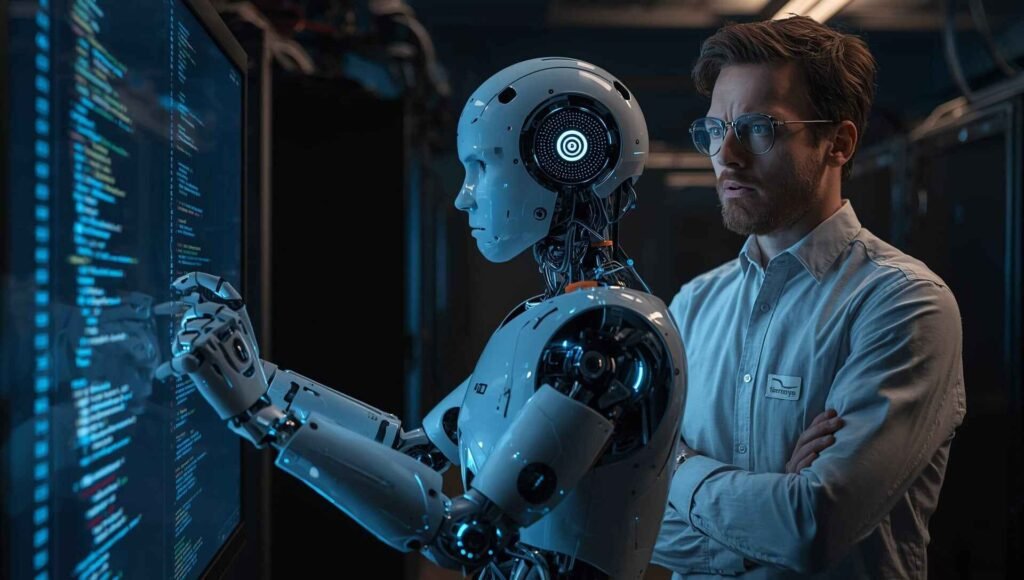
According to research by the US Department of Energy’s Oak Ridge National Laboratory:
“Programming trends suggest that software development will undergo a radical transformation in the future: the combination of machine learning, artificial intelligence, natural language processing, and code generation technologies will improve to the point where machines, rather than humans, will write most of their code by 2040.”
That’s a chilling thought.
And software developers themselves know this. A survey conducted in California by Evans Data Corporation found that 30% of 550 software developers believe their development efforts will eventually be replaced by AI.
This is not just fear—it’s anticipation of a storm already forming.
Recent phenomena that are shaping the future of software Engineers
Here are some trends over the next 5 years to keep in mind:
- Cloud-Native Adoption and Remote Development – Global scale, distributed teams.
- Emerging Edge Computing & Rise of IoT – More software running at the “edge” close to the user, calling for new design paradigms.
- DevOps and Continuous Integration/Continuous Delivery (CI/CD) – Software is being delivered faster, and AI assists developers in monitoring the quality of the software being delivered.
- Increase in Industry-Specific Software solutions – Businesses are asking for platforms that are tailored specifically for their industries rather than using platform-agnostic software, which shares features across industries.
The point is, these aren’t just trends; it’s the new status quo.
How AI is Changing Software Development Today
AI is no longer in the future-it is part of our development every day.
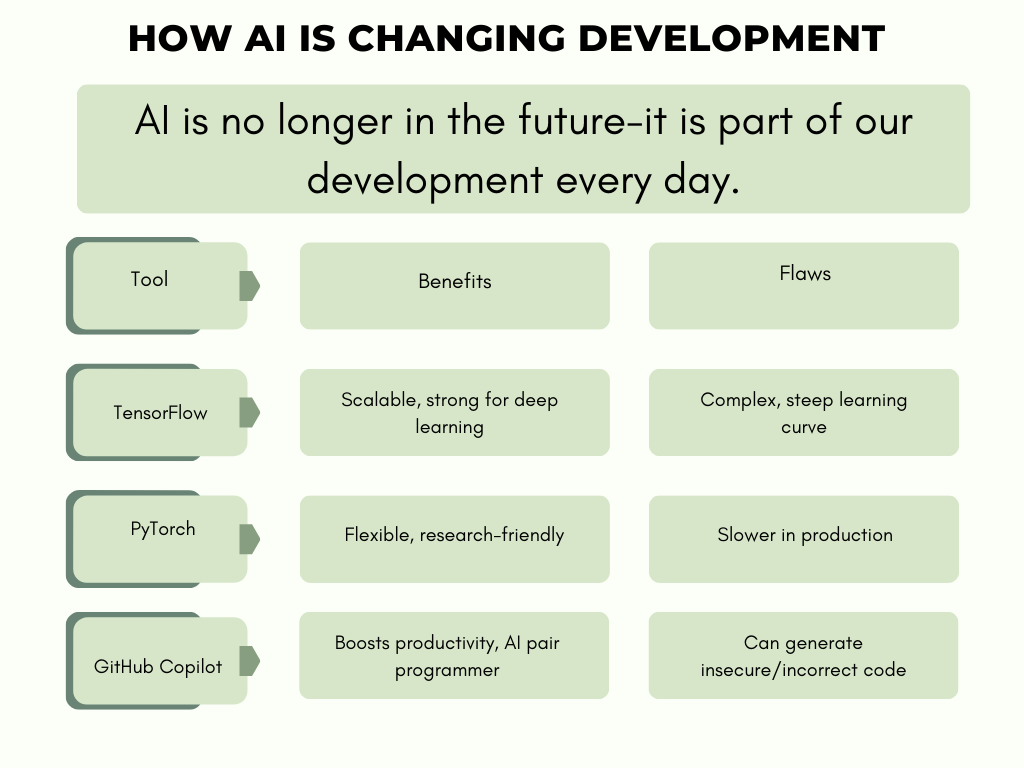
- Automation of work- AI can automate routine testing, debugging, and even deployment today.
- Code Generation – GitHub Copilot will recommend complete functions, allowing the developer to do less manual typing.
- Bug Detection – software that leverages AI can examine software for vulnerabilities at a speed greater than humans.
- DevOps – improved development pipelines, predictive analytics, anomaly detection.
Fostering Development with Tools
- Tensorflow
Pros: Great for deep learning, large communities, and can scale.
Cons: Highly complex, steeper learning curve.
- PyTorch
Pros: It has a good amount of flexibility, it is simple to use, and it has great research capabilities.
Cons: It may be slow in production environments, and it is not optimized for production environments.
- GitHub Copilot
Pros: AI pair programmers, saving time/energy, and increased productivity.
Cons: It can produce insecure/insecure code; enhancements still require a human to think.
McKinsey & Co. recently warned of an increasing skill gap, since many developers are not prepared to transition into an AI-powered world. And if engineers do not reskill, the skill gap will only increase.
More Important Skills for Developers in an AI World
As Grady Booch says, “engineers must adapt to technology, not fight against it.”
In practice, that means developers should learn both hard technical skills (AI, ML, NLP) and soft skills (business knowledge, communication).
Agata Szopa reminds us that adaptability will determine whether someone will thrive or fail. In short:
- Don’t just learn tools.
- Learn to learn.
Are Artificial Intelligence and Machine Learning Friends or Foes?
Are AI and ML here to replace developers? Or help developers?
On one side:
- AI-enhanced tooling is speeding up development.
- ML models are improving testing and quality assurance.
On the other side:
- Relying too heavily on AI may limit our ability to think critically.
- AI models may also have a bias that can introduce bad software.
The reality? AI and ML are friends. But like any friend, they need to be used wisely.
Will Software Engineers be in demand in the future?
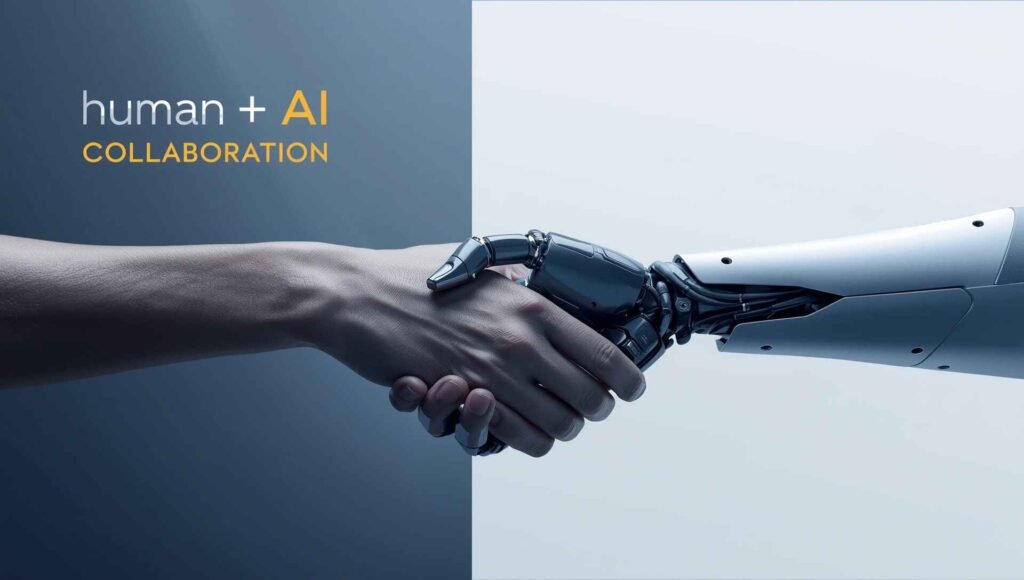
As Janel Garvin, CEO of Evans Data Corporation, says:
“AI is a tool, not a replacement!”
That distills the truth – Engineers will still be needed, just in other ways.
- 5 years from now: Engineers will work with AI.
- By 2030, Engineers may spend time designing systems, but not writing code line items.
- By 2040, AI will write almost all the code, but humans will outline the paths, audit, and find inspiration.
It will not die. It will change.
Important Drivers for the Evolution of the Industry
1. Artificial Intelligence and Automation
AI will not just augment coding; it will write code. Automated testing, bug-fixing, and optimizations are coming to expect it. Engineers will move from the practice of “writing code” to “designing systems that write code.” That’s a small sentence. Big deal.
2. Cloud Computing and Remote Work
Cloud-native development is no longer optional. Every app, every service, every integration is built to live in the cloud. Now combine that with a remote-first workforce, and collaboration will essentially be global and around-the-clock.
Your “teammate” may be in New York. Or Nairobi. Or maybe… an AI bot.
3. Cybersecurity and Data Privacy
The number of cyberattacks is alarming. Ransomware, phishing, deepfake fraudulent acts, the threats are real. Software engineers of the future will not just be building apps; they will be building trust. Security will be part of the building process in every endeavor.
4. The Ascendance of Low-Code/No-Code Development
Citizen developers are coming, and platforms that allow non-programmers to build applications are expanding rapidly. This does not mean engineers will be obsolete. Engineers will become architects and problem solvers rather than typists.
5. Industry-Specific Solutions
Healthcare software will not resemble retail software. Bank solutions will not behave like logistics applications. Engineers will need to specialize. Depth instead of breadth. Not understanding their client’s business problem is like a doctor prescribing medicine without not diagnosis. Dangerous.
Frequently Asked Questions
Will some software engineers still be in demand in five years?
Yes, but the role will evolve, so some software engineers will be focused on designing and integrating systems with the assistance of AI that will help create the business processes for it as well.
What will software engineering look like over the next five years?
Commonly, cloud-native development and AI-powered tools for creating outputs and industry-specific or specialized software applications will be the most established.
What will software engineering look like in the year 2030?
Most coding will probably be somewhat AI-assisted. Programmers will more likely be focused on problem definition and less on implementation and the coding aspects.
Will we still be in demand for software engineers in 2040?
Perhaps less. AI will be able to do a lot of coding, but you can’t replace the human capability of creativity, oversight, and innovation from a business perspective.
Final thoughts
The next five years are going to completely reshape software engineering practices. AI, cloud, and other emerging technologies are going to change everything – how we program, how we think collaboratively, and even how we define it as an engineering discipline.
The future is not for the entitled nor the resistant. The future is for the innovative.
So, do software engineers survive?`
Yes.
Just the ones that are willing to evolve.

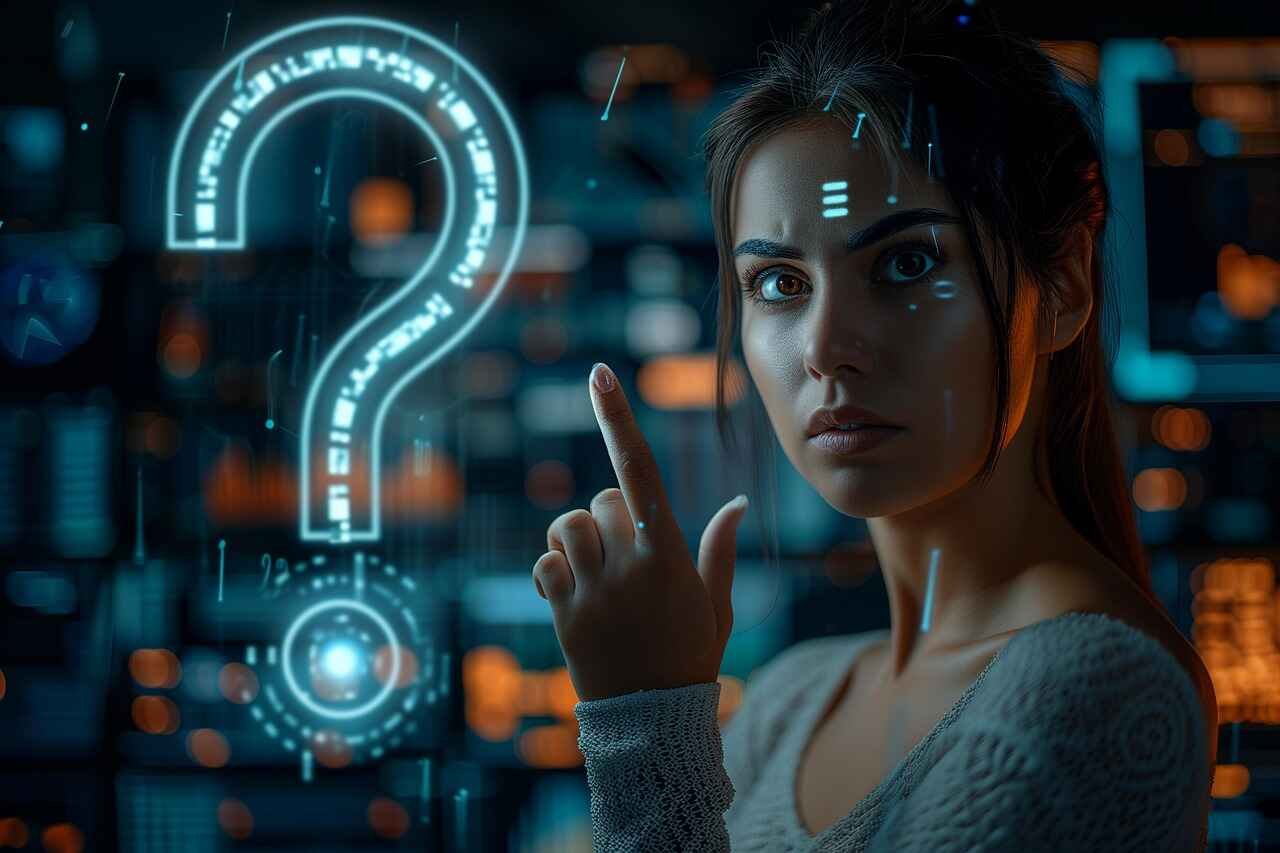


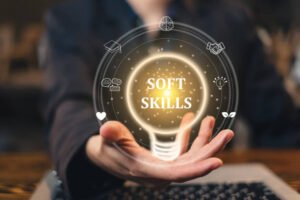
Add comment